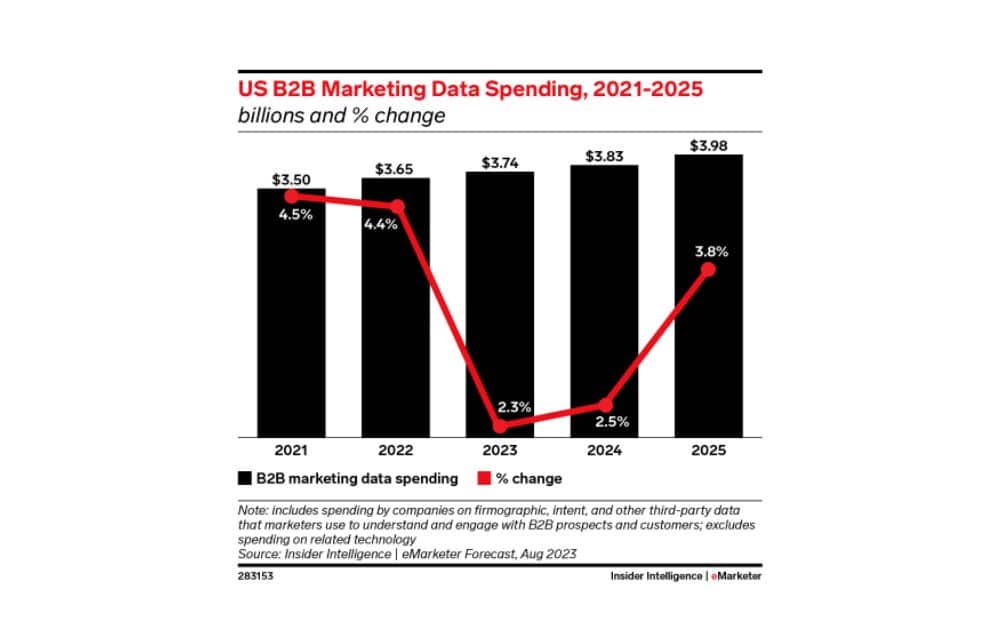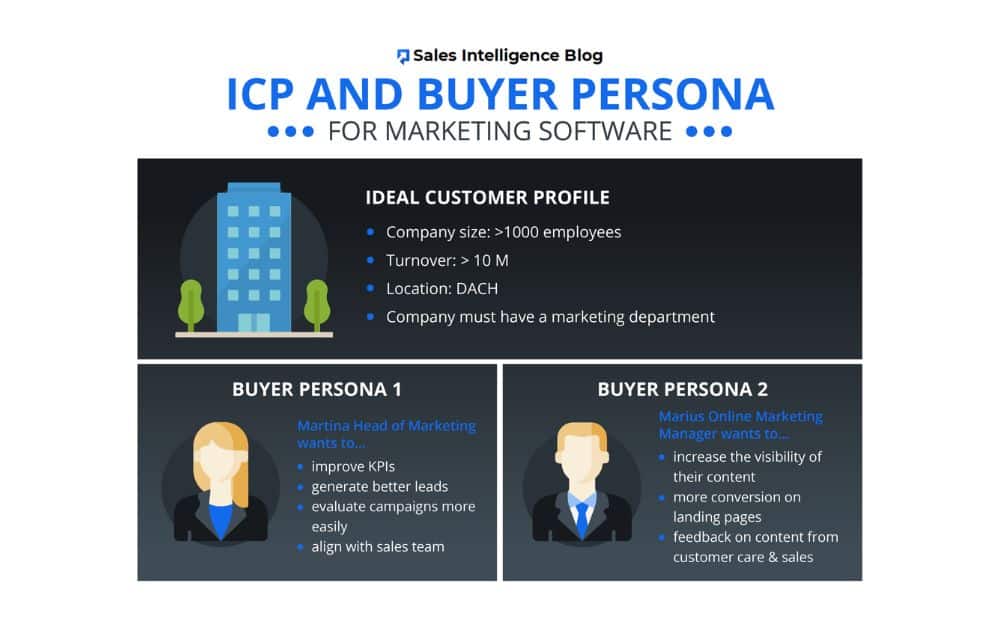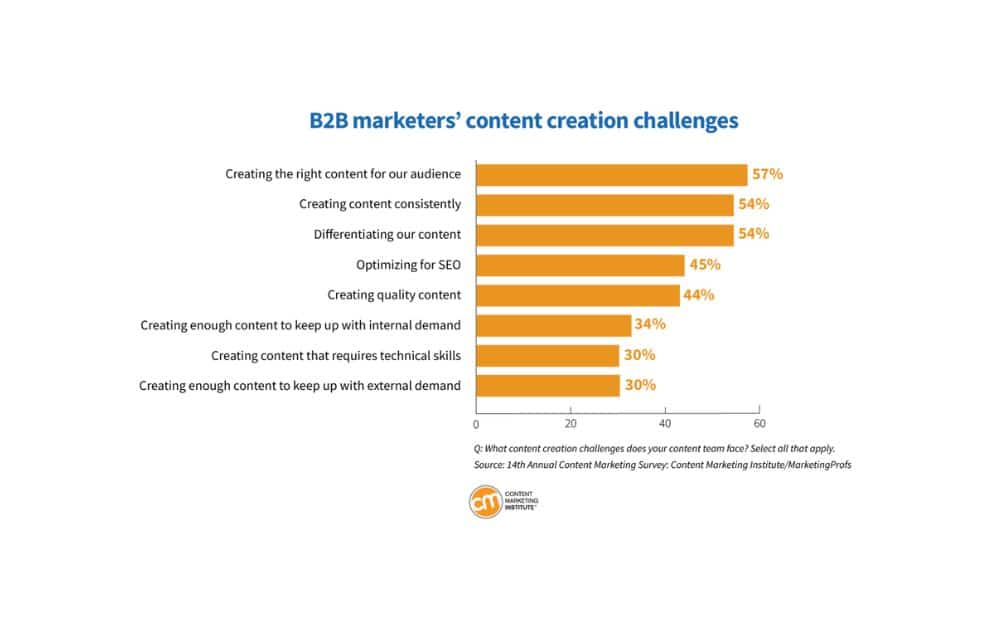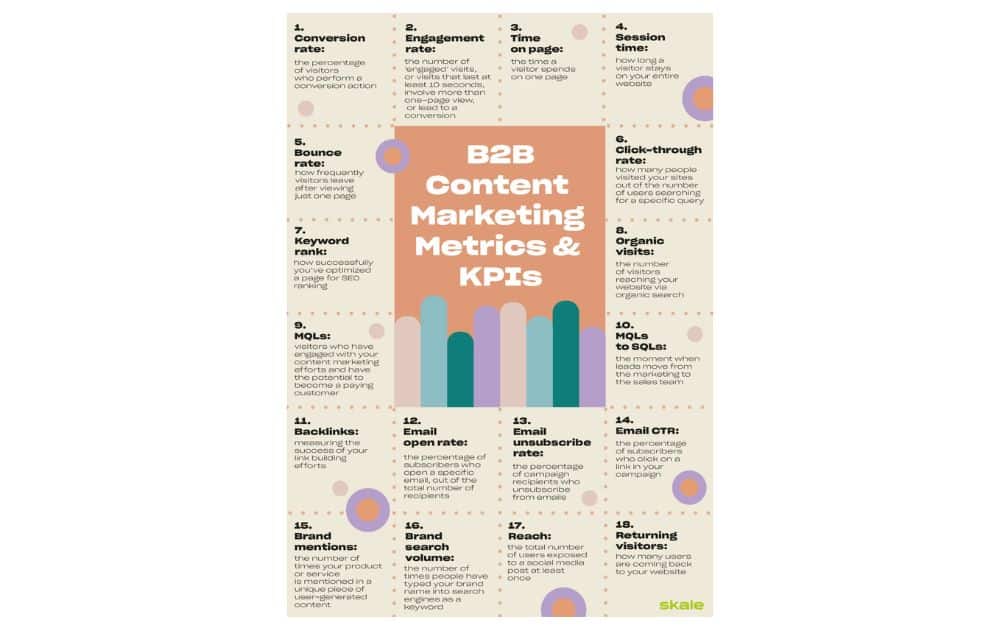If you’re new to crafting a B2B content marketing strategy, it may feel like assembling a complex puzzle. Each piece is a different aspect of your marketing tactics, from understanding your audience’s needs to building content that resonates with them.
It’s more than churning out content just for the sake of it. It’s about offering a narrative that reflects your brand as an authority within your niche.
Let’s unravel the secrets to building a B2B content marketing strategy that captures attention and fosters lasting relationships with your business clientele.
Understanding B2B Content Marketing
Business-to-business or B2B content marketing is the strategic approach to making and distributing content to attract businesses or those making purchasing decisions. Since the efforts must be strategic, each piece of content must be:
- Valuable
- Relevant
- Consistent
According to Insider Intelligence’s forecasts, US B2B marketing data spending is expected to increase by 2.5% in 2024, a slight rise from 2023’s 2.3% growth.

These numbers highlight just how important it is to have a strong B2B content marketing strategy that works for your niche.
B2B vs B2C
It’s crucial to note that B2B content marketing has stark differences from business-to-consumer or B2C content marketing. The former focuses on organizations or individuals making purchases on behalf of their organization, while the latter focuses on buying products or services for personal use.
Here are a few key characteristics of B2B content marketing to keep in mind if you’re a business or a seller looking to take on the task:
- Educational and Informative. B2B content not only persuades its target audiences to purchase products and services but also educates them about industry trends, challenges, and solutions. These efforts help their audience to make informed decisions.
- Longer Sales Cycles. Unlike in B2C content marketing, a B2B content marketing strategy typically caters to longer sales cycles. That said, every effort is geared towards nurturing leads over time.
- Targeted and Personalized. Given the specific nature of B2B markets, content is highly targeted and often personalized to address the unique needs of different industry segments or personas.
- ROI-focused. A B2B content marketing strategy is closely tied to measurable business outcomes. That said, every tactic is aimed at return on investment (ROI) and lead generation.
Compared to B2C, a content marketing strategy for B2B is often more formal and informative. After all, it needs to focus on industry insights and expertise, and can’t afford to lean on more personal and casual connections like B2C.
Benefits of a Strong B2B Content Marketing Strategy
Here are a few benefits of well-planned B2B content marketing strategy tactics for businesses and sellers:
Enhanced Brand Visibility and Authority
By sharing insightful, expert content, businesses can position themselves as thought leaders in their industry. This not only enhances brand visibility but also builds credibility and trust among potential customers.
Improved Lead Generation and Nurturing
A targeted content strategy helps attract the right audience to your website. By addressing specific industry challenges and solutions, you can draw in prospects who are more likely to be interested in your offerings.
Increased Customer Engagement and Loyalty
Engaging content encourages interaction between the brand and its audience. This interaction can lead to stronger relationships and a loyal customer base that feels connected to the brand.
How to Create a B2B Content Marketing Strategy
Here’s a step-by-step B2B content marketing strategy checklist to help you get started:
Related content: Creating an Amazon Sales Funnel
Define Your Target Audience
It all starts with identifying your ideal client or customer profile or ICP. In order to do this, you need to analyze your best customers to create a detailed profile of the client you’re targeting. This profile must include details such as industry, company size, and key challenges.
Buyer Persona, on the other hand, is a semi-fictional representation of your ideal customer based on market research and real data about your existing customers. These personas are the decision-makers within your ICP company.
Here’s an example of an ICP and buyer persona example for marketing software from Sales Intelligence Blog:

- Actionable Tip. Conduct interviews with your current clients to gain insights into what attracted them to your solutions. You can also use social listening tools to monitor industry discussions and identify common pain points.
Set Clear Objectives and Goals
Ensure your content marketing strategy supports your overarching business goals, whether it’s lead generation, brand awareness, or customer retention.
Use SMART goal setting for content marketing, meaning the goals for your strategy must be:
- Specific
- Measurable
- Achievable
- Relevant
- Time-bound
Not having clear goals is one of the worst eCommerce mistakes you can commit, whether you’re a B2C or a B2B enterprise.
- Actionable Tip: Map out how each content marketing objective ties back to a specific business goal. In addition, set a clear timeline for each goal, with milestones to assess progress along the way.
Conduct a Content Audit
Review your current content to assess what’s working and what isn’t. It also pays to identify topics or formats you haven’t covered that could address your audience’s needs.
- Actionable Tip: Use analytics to identify your top-performing pieces and understand why they succeed. Compare your content with competitors’ to spot any gaps in your content library.
Develop a Content Plan
Data from the Content Marketing Institute reveals that almost six out of ten marketers find it challenging to create the right content for their audience.
Other challenges include creating content consistently, differentiating content from competitors, and optimizing for SEO.

B2B content marketing strategy example formats you may want to explore:
- Blog posts
- Whitepapers
- Case studies
- eBooks
- Infographics
- Webinars
- Videos
- Podcasts
- Social media posts
- Email newsletters
- Interactive tools
- Presentations and slide decks
- Research reports and surveys
- Tutorials
Decide on a variety of content types that will best engage your target audience. As you craft your B2B content marketing strategy template, look for topics that your audience needs, as well as industry trends and unique insights.
- Actionable Tip: Experiment with different formats to see what resonates most with your audience, then adjust your strategy accordingly.
Execution: Creating and Distributing Content
Focus on quality, relevance, and value. It’s also vital to ensure your content is well-researched and expertly crafted. After all, you’re trying to build your authority as a thought leader; you can’t afford to put out pieces of content that are half-baked or not based on solid research.
At this stage, you’ll also need to identify the most effective channels for reaching your audience, such as LinkedIn or industry forums. As you use multiple channels, make sure to tailor your messaging for each platform for maximum engagement.
- Actionable Tip: Incorporate original research or expert quotes to add credibility and uniqueness to your content.
Measure and Optimize
Track key performance indicators or KPIs to monitor the effectiveness of your B2B content marketing strategy. This step is crucial to see what’s working and what’s not and adjust the strategy as needed.
Skale names the following as B2B content marketing metrics and KPIs you may need to measure, depending on the nature of your business.

- Actionable Tip: Schedule quarterly reviews of your content strategy to assess its effectiveness and make necessary adjustments.
B2B Content Marketing Strategy Case Studies
Here are two B2B content marketing strategy examples that illustrate how a robust strategy can catapult ventures to success.
General Electric (GE) Reports
GE Reports is an online media portal by General Electric that shares content about emerging tech. The portal’s stories highlight GE’s approach to focusing on storytelling rather than direct brand promotion, which has helped it establish an audience while providing valuable content to its audience.
HubSpot’s Marketing Blog
HubSpot, known for its software products for sales, customer service, and inbound marketing, has also excelled in B2B content marketing through its marketing blog. The blog teaches small businesses everything they need to know about marketing, using a variety of content types to educate and engage its audience.
Frequently Asked Questions (FAQs)
Here are a few frequently asked questions about B2B content marketing:
What makes B2B content successful?
B2B content becomes successful when it resonates with its intended audience by providing valuable insights and solutions. The key to a strong B2B content marketing strategy is understanding the audience’s unique needs and pain points.
Successful B2B content positions the company as a thought leader and trusted advisor in its industry, fostering relationships and encouraging meaningful interactions.
What content appeals in B2B marketing?
The types of content that stand out in B2B marketing are those that offer value and relevance to its professional audience. These content types may include in-depth industry analyses, case studies demonstrating solutions to common business problems, and how-to guides for complex processes.
Thought leadership pieces that offer fresh insights on emerging trends can also be good additions, as well as webinars, whitepapers, and eBooks.
What are B2B marketing strategies on social media?
B2B marketing strategies on social media involve using platforms like LinkedIn, Twitter, and Facebook to engage a professional audience.
The strategy lies in offering valuable content like industry insights, success stories, and live events that foster relationships and encourage interaction.
Author




